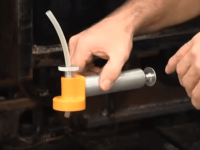Justifying An Oil Analysis Program An oil analysis program must have a goal in mind for it to be effective, and the goal ultimately determines some of the factors associated with the program. As examples, common goals may include, reducing oil consumption, extending equipment life and increasing reliability. When setting a goal of extending drain…
Read more
Justifying An Oil Analysis Program







